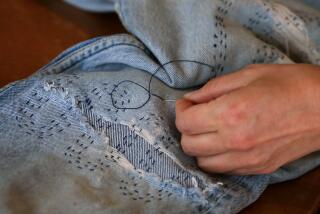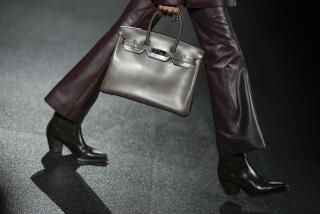Edith Flagg dies at 94; L.A. designer helped popularize polyester
Fashion designer Edith Flagg was on a trip to Switzerland in the mid-1960s when she encountered, in a shop, a knitted clothing fabric that had a resemblance to wool but didn’t much wrinkle.
“I said to the girl, ‘What is this?’” Flagg said on the reality show “Million Dollar Listing” that features her grandson, Josh Flagg. “‘This is a new fiber, comes from England,’” the clerk told her.
An impressed Edith Flagg began importing the wash-and-wear polyester fabric, and became an early promoter of its use in fashion. It helped turn her into a multimillionaire.
“As ugly as the stuff was, it was great,” said Josh Flagg in a video interview. “It was good for my grandmother, and my family.”
Edith Flagg, 94, died Wednesday at her home in Century City of natural causes, said her grandson.
She started her clothing design and manufacturing business, Edith Flagg Inc., in Los Angeles in the early 1950s. By then, she had already led a precarious, war-torn life.
Born Edith Feuerstein on Nov. 1, 1919 in Vienna, according to documents on file at the Los Angeles Museum of the Holocaust she was raised in Galati, Romania, where her father was a professional photographer. At 15 she moved to Vienna to study fashion and was in the city when Nazi troops marched in, occupying the country in 1938.
Because of Hitler’s venomous policies against Jews, she left Austria with her boyfriend, Hans Stein, and settled in Holland, where they were married. When the Nazis invaded their adopted country they joined the Dutch resistance, said Josh Flagg. Hans Stein was captured and sent to Auschwitz, where he died in 1945.
She met her second husband, Eric Flagg, in Holland, and after the war they made their way to the U.S., where she worked at various jobs in the clothing industry, including as a seamstress, before starting her own company.
Ilse Metchek, president of the California Fashion Assn. said Flagg was not known in the industry as a design innovator. But there was one part of the business for which she became a role model.
“Edith was one of the first to understand P.R. [public relations], and how important it was in this business,” Metchek said. Flagg put her own name on her products and made sure people knew it.
“She knew how valuable it was to be in the right place at the right time, to get her name out there,” Metchek said. “If there was an event, there was Edith.”
Her business was bolstered by her use of the polyester fabric Crimplene that she imported from England on an exclusive contract. Though polyester has since gotten a bad name in some quarters, her dresses from nearly 50 years ago are now being sold online as “true vintage.”
As fashions changed, so did the industry. In the early years of Flagg’s business, most of the buyers who came to her showrooms were from retail shops across the nation, and she could keep close tabs on her products, which were made primarily in the Los Angeles area. As the years passed, however, department stores and other large outfits became far more dominant and manufacturing mostly shifted to overseas.
Flagg didn’t enjoy the changes. “It wasn’t elegant like it used to be,” Josh Flagg said. “There was Target and all these other stores.”
She closed her company in 2000 and concentrated on philanthropic concerns, donating to Jewish and medical causes.
In the last few years, Flagg became more famous than ever as a result of her appearances on the Bravo cable network’s “Million Dollar Listing,” where she gave business and life advice in accented English that sometimes was bolstered by subtitles.
“I didn’t make money with my money,” she said on an episode, extolling the virtues of hard work. “I make money with me. It’s a big difference.”
Survivors include her son, Michael Hans Flagg, and grandson Josh. Eric Flagg died in 1999.
Twitter: @davidcolker
More to Read
Start your day right
Sign up for Essential California for the L.A. Times biggest news, features and recommendations in your inbox six days a week.
You may occasionally receive promotional content from the Los Angeles Times.







